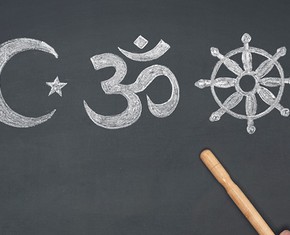The views expressed in our content reflect individual perspectives and do not represent the authoritative views of the Baha'i Faith.
Remembrance of God is like the rain and dew which bestow freshness and grace on flowers and hyacinths, revive them and cause them to acquire fragrance, redolence and renewed charm. – Abdu’l-Baha, from a tablet to an individual believer.
Every culture in the world has its feasts, festivals, fiestas, parties, banquets and celebrations. Feasts may be the very oldest of human celebratory gatherings. When primitive human beings successfully hunted enough game to feed the entire tribe; or when a harvest provided more than enough food for everyone, the natural, delightful outcome usually involved a feast.
Today the world holds festivals just about everywhere, and for a whole host of reasons: music festivals, harvest festivals, New Year’s festivals, midsummer and winter carnivals, feasts of celebration on secular holidays like Thanksgiving, and literary, film and storytelling festivals, too.
 The world’s Faiths observe the most popular feasts and festivals. The Hindu festivals of Diwali and Holi; the Jewish feast of Passover, the Christian celebrations of Easter and Christmas (originally called the Feast of the Nativity of Our Lord), the Buddhist Esala Perahera and Esala Puja festivals; the Islamic Eid al-Fitr festival; the Baha’i celebrations of Naw-Ruz (New Year’s) and Ridvan (the observance of the beginnings of Baha’u’llah’s revelation)—all of these mark happy holidays when people come together in unity to commemorate their joy.
The world’s Faiths observe the most popular feasts and festivals. The Hindu festivals of Diwali and Holi; the Jewish feast of Passover, the Christian celebrations of Easter and Christmas (originally called the Feast of the Nativity of Our Lord), the Buddhist Esala Perahera and Esala Puja festivals; the Islamic Eid al-Fitr festival; the Baha’i celebrations of Naw-Ruz (New Year’s) and Ridvan (the observance of the beginnings of Baha’u’llah’s revelation)—all of these mark happy holidays when people come together in unity to commemorate their joy.
Baha’is don’t just celebrate the recurring annual Holy Days on the Baha’i calendar, though—every Baha’i community around the world has a Feast every 19 days, at the beginning of each new Baha’i month:
In every cycle and dispensation, the feast hath been favoured and loved, and the spreading of a table for the lovers of God hath been considered a praiseworthy act. This is especially the case today, in this dispensation beyond compare, this most generous of ages, when it is highly acclaimed, for it is truly accounted among such gatherings as are held to worship and glorify God. Here the holy verses, the heavenly odes and laudations are intoned, and the heart is quickened, and carried away from itself.
The primary intent is to kindle these stirrings of the spirit, but at the same time it follows quite naturally that those present should partake of food, so that the world of the body may mirror the spirit’s world, and flesh take on the qualities of soul; and just as the spiritual delights are here in profusion, so too the material delights.
Happy are ye, to be observing this rule, with all its mystic meanings, thus keeping the friends of God alert and heedful, and bringing them peace of mind, and joy. – Abdu’l-Baha, Selections from the Writings of Abdu’l-Baha, pp. 90-91.
A Baha’i Feast doesn’t need to be a sumptuous banquet. It can be a very simple observance, as long as it serves the purposes of worship, hospitality, fellowship and unifying human hearts:
Verily, it is enjoined upon you to offer a feast, once in every month, though only water be served; for God hath purposed to bind hearts together, albeit through both earthly and heavenly means. – Baha’u’llah, The Most Holy Book, p. 40.
Baha’i Feasts have three essential components: a spiritual and devotional portion where people offer prayers and read from the Baha’i writings to worship God; a consultation portion where people can freely discuss the affairs of the community; and a portion for socializing, refreshments and fun:
This feast is held to foster comradeship and love, to call God to mind and supplicate Him with contrite hearts, and to encourage benevolent pursuits.
That is, the friends should there dwell upon God and glorify Him, read the prayers and holy verses, and treat one another with the utmost affection and love.
As to the Nineteen Day Feast, it rejoiceth mind and heart. If this feast be held in the proper fashion, the friends will, once in nineteen days, find themselves spiritually restored, and endued with a power that is not of this world. – Abdu’l-Baha, Selections from the Writings of Abdu’l-Baha, p. 91.
When you go to a Baha’i Nineteen Day Feast you’ll probably also hear music, laughter and the voices of a broadly diverse cross-section of humanity. The Nineteen Day Feast truly and uniquely represents a grassroots approach to community building and open democratic discussion, where Baha’is can freely express themselves and contribute their opinions:
Just as in the world of politics there is need for free thought, likewise in the world of religion there should be the right of unrestricted individual belief. Consider what a vast difference exists between modern democracy and the old forms of despotism. Under an autocratic government the opinions of men are not free, and development is stifled, whereas in democracy, because thought and speech are not restricted, the greatest progress is witnessed. It is likewise true in the world of religion. When freedom of conscience, liberty of thought and right of speech prevail — that is to say, when every man according to his own idealization may give expression to his beliefs — development and growth are inevitable. – Abdu’l-Baha, The Promulgation of Universal Peace, p. 197.
For Baha’is, the concept and the practical, day-to-day exercise of worship, as you’ve seen throughout this series of essays, goes far beyond the old traditional use of the term. Baha’i worship includes individual prayer and supplication; a daily practice of meditation and reading from the holy writings; a personal commitment to acquiring and developing the virtues and attributes that the prophets of God exemplify; participation in a unified community of loving and like-minded people; and most importantly, making the conscious, consistent decision to turn prayer and worship into altruistic action:
Therefore strive that your actions day by day may be beautiful prayers. Turn towards God, and seek always to do that which is right and noble. Enrich the poor, raise the fallen, comfort the sorrowful, bring healing to the sick, reassure the fearful, rescue the oppressed, bring hope to the hopeless, shelter the destitute!
…God, who sees all hearts, knows how far our lives are the fulfilment of our words. – Abdu’l-Baha, Paris Talks, p. 81.
You May Also Like
Comments

















Baha'i love.
Paul